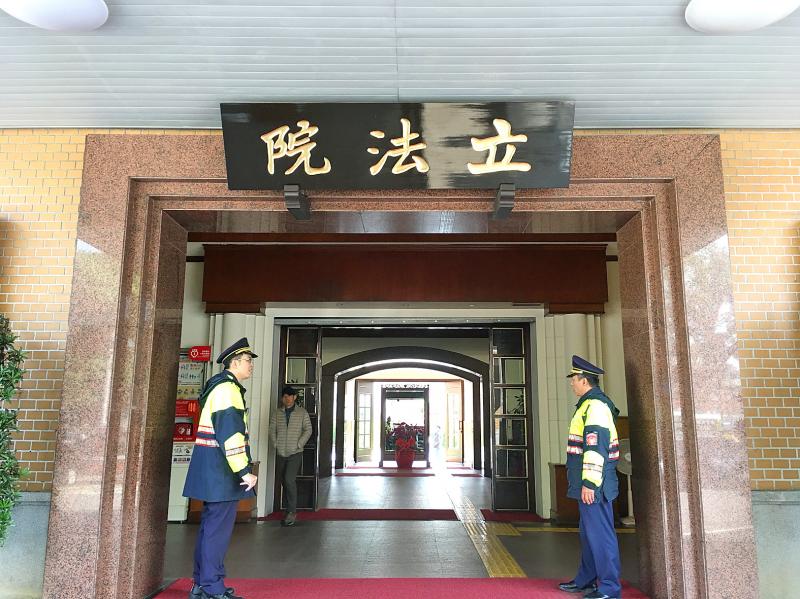The legislative caucuses of three parties yesterday reiterated calls to amend a law governing relations with Hong Kong to elucidate steps the government could take to help protesters there.
The Taiwan People’s Party (TPP), the Chinese Nationalist Party (KMT) and the New Power Party (NPP) said that they have separately created draft amendments to Article 18 of the Act Governing Relations with Hong Kong and Macau (香港澳門關係條例).
The article requires the government to aid Hong Kongers who face political persecution, but does not specify a specific course of action.

Photo: Lin Liang-sheng, Taipei Times
The KMT’s proposal, which would create a way for Hong Kongers with criminal records who are believed to be victims of political persecution to be allowed to enter Taiwan, was submitted by KMT Legislator Charles Chen (陳以信).
Individuals with criminal records would normally be required to apply for special permission to enter Taiwan, and entry without permission is punishable by up to three years in prison and a fine of up to NT$90,000, according to Article 74 of the Immigration Act (入出國及移民法).
The KMT’s amendment would exclude Hong Kongers from Article 74.
It was necessary for the amendment to address entry into Taiwan, as this is not covered by the laws governing Hong Kong, Chen said, adding that the change must be stipulated so that Taiwan can effectively provide emergency help to Hong Kongers.
The proposal would be ready for review by Friday at the earliest, he said.
Chen said he still hopes that full democracy would be implemented in Hong Kong.
Separately, NPP caucus whip Chiu Hsien-chih (邱顯智) said that his party finished its proposed amendment at the end of last month and was waiting for the draft to be reviewed.
An amendment is crucial, as the situation in Hong Kong is becoming “increasingly dangerous,” and there will likely be a spike in the number of people seeking help from Taiwan, Chiu said.
Hong Kongers and people from Macau who, because of their political views, expressions or the community they belong to, come under threat in the territories should be offered political protection, he said, adding that the NPP draft says that they would be eligible to apply for protection through rules governing political asylum seekers.
Chiu called on Legislative Speaker You Si-kun (游錫堃) to convene a cross-party caucus meeting as soon as possible to discuss the NPP proposal and to issue a joint statement denouncing the Chinese Communist Party’s planned implementation of a national security law in Hong Kong.
Meanwhile, TPP caucus whip Lai Hsiang-ling (賴香伶) said that the TPP completed a proposal on May 15 and that it had already passed one reading.
The TPP supports the democracy movement in Hong Kong, Lai said.
Echoing statements from the other parties, she said an amendment was urgently needed to bolster the government’s efforts to help protesters in Hong Kong.

POSITIVE DEVELOPMENT: Japan and the US are expected to hold in-depth discussions on Taiwan-related issues during the meeting next month, Japanese sources said The holding of a Japan-US leaders’ meeting ahead of US President Donald Trump’s visit to China is positive news for Taiwan, former Japan-Taiwan Exchange Association representative Hiroyasu Izumi said yesterday. After the Liberal Democratic Party’s landslide victory in Japan’s House of Representatives election, Japanese Prime Minister Sanae Takaichi is scheduled to visit the US next month, where she is to meet with Trump ahead of the US president’s planned visit to China from March 31 to April 2 for a meeting with Chinese President Xi Jinping (習近平). Japan and the US are expected to hold in-depth discussions on Taiwan-related issues during the

‘LIKE-MINDED PARTNER’: Tako van Popta said it would be inappropriate to delay signing the deal with Taiwan because of China, adding he would promote the issue Canadian senators have stressed Taiwan’s importance for international trade and expressed enthusiasm for ensuring the Taiwan-Canada trade cooperation framework agreement is implemented this year. Representative to Canada Harry Tseng (曾厚仁) in an interview with the Central News Agency (CNA) said he was increasingly uneasy about Ottawa’s delays in signing the agreement, especially as Ottawa has warmed toward Beijing. There are “no negotiations left. Not only [is it] initialed, we have three versions of the text ready: English, French and Mandarin,” Tseng said. “That tells you how close we are to the final signature.” Tseng said that he hoped Canadian Prime Minister Mark Carney

President William Lai (賴清德) yesterday bestowed one of Taiwan’s highest honors on Saint Vincent and the Grenadines (SVG) Ambassador Andrea Clare Bowman in recognition of her contributions to bilateral ties. “By conferring the Order of Brilliant Star with Grand Cordon on Ambassador Bowman today, I want to sincerely thank her, on behalf of the Taiwanese people, for her outstanding contribution to deepening diplomatic ties between Taiwan and SVG,” Lai said at a ceremony held at the Presidential Office in Taipei. He noted that Bowman became SVG’s first ambassador to Taiwan in 2019 and

A man walks past elementary school artworks at the Taipei Lantern Festival in Ximen District yesterday, the first day of the event. The festival is to run from 5pm to 10pm through March 15.